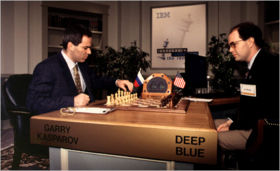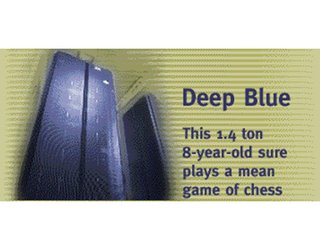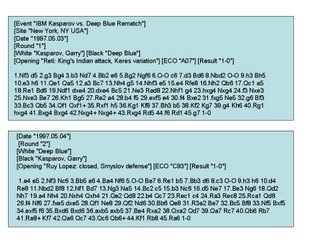
Rented and watched a BBC Documentary
Game Over: Kasparov and the Machine yesterday. It is about a rematch of chess games between
Garry Kasparov and
Deep Blue Computer of IBM in 1997 in New York. It wasn't exactly one of the most exciting documentaries that I ever watched! However, I did learn a few interesting things. During and after the matches, Kasparov complained that the rules and the way the games were played were not fair. Not knowing the whole story, I used to think that his allegations were totally baseless. Now, even though I believe that all his allegations are not valid, I think that he had a point to an extent. I posted all
six games of 1997 rematch at the end of this Blog Post. Here is the scoop:
The computer system dubbed "Deep Blue" was the first machine to win a chess game against a reigning world champion (Garry Kasparov) under regular time controls. This first win occurred on February 10, 1996, and Deep Blue - Kasparov, 1996, Game 1 is a famous chess game. However, Kasparov won 3 games and drew 2 of the following games, beating Deep Blue by a score of 4 - 2. The match concluded on February 17, 1996.
 Deep Blue was then heavily upgraded (unofficially nicknamed "Deeper Blue") and played Kasparov again in May 1997, winning the six-game rematch 3.5 - 2.5, ending on May 11th, finally ending in game six. Deep Blue thus became the first computer system to defeat a reigning world champion in a match under standard chess tournament time controls.
Deep Blue was then heavily upgraded (unofficially nicknamed "Deeper Blue") and played Kasparov again in May 1997, winning the six-game rematch 3.5 - 2.5, ending on May 11th, finally ending in game six. Deep Blue thus became the first computer system to defeat a reigning world champion in a match under standard chess tournament time controls.
After losing the match, Kasparov said that he sometimes saw deep intelligence and creativity in the machine's moves, which he could not understand. He also suggested that humans may have helped the machine during the match. His argument was based on the fact that other computer programs at that time could not find some of the strong moves that Deep Blue did. In particular, 37. Be4 in the second game. However, recent computer programs such as Rybka and the Computer Assistant Project find this move. In addition, Kasparov said the program played a human-like mistake on move 44. Kf1 in the same game. However, recent programs also make the same mistake. Kasparov demanded a rematch, but IBM declined and retired Deep Blue.
Deep Blue's evaluation function was initially written in a generalized form, with many to-be-determined parameters (e.g. how important is a safe king position compared to a space advantage in the center, etc.). The optimal values for these parameters were then determined by the system itself, by analyzing thousands of master games. The evaluation function had been split into 8,000 parts, many of them designed for special positions. In the opening book there were over 4,000 positions and 700,000 grandmaster games. The endgame database contained many six piece endgames and five or fewer piece positions. Before the second match, the chess knowledge of the program was fine tuned by grandmaster Joel Benjamin. The opening library was provided by grandmasters Miguel Illescas, John Fedorovich and Nick De Firmian. Deep Blue's programmers tailored the computer program to beat Kasparov by studying in great detail prior games Kasparov had played. When Kasparov requested that he be allowed to study other games that Deep Blue had played so as to better understand his opponent, IBM refused.
I think that the rematch was not fair because Kasparov was not given access to the input given to Deep Blue (for whatever it was worth), while a group of Grand Masters carefully programmed Deep Blue specifically to play against Kasparov. So, Deep Blue had a very good understanding of Kasparov, while Kasparov had no clue on the strengths and weaknesses of Deep Blue. I think allegations by the highest
ELO rated player ever, deserve some attention.
The game Arimaa was invented by Omar Syed, a computer engineer trained in artificial intelligence. Syed was inspired by Garry Kasparov's defeat at the hands of the chess computer Deep Blue to design a new game which would be difficult for computers to play well, but would have rules simple enough for his four-year-old son Aamir to understand. ("Arimaa" is "Aamir" spelled backwards plus an initial "a"). In 2002 Syed published the rules to Arimaa and announced a $10,000 prize, available yearly through 2020, for the first computer program (running on inexpensive, off-the-shelf hardware) able to defeat a top-ranked human player in a match six games or longer. Syed has applied for a patent on the Arimaa rules, and the name "Arimaa" is trademarked.



 Rented and watched a BBC Documentary Game Over: Kasparov and the Machine yesterday. It is about a rematch of chess games between Garry Kasparov and Deep Blue Computer of IBM in 1997 in New York. It wasn't exactly one of the most exciting documentaries that I ever watched! However, I did learn a few interesting things. During and after the matches, Kasparov complained that the rules and the way the games were played were not fair. Not knowing the whole story, I used to think that his allegations were totally baseless. Now, even though I believe that all his allegations are not valid, I think that he had a point to an extent. I posted all six games of 1997 rematch at the end of this Blog Post. Here is the scoop:
Rented and watched a BBC Documentary Game Over: Kasparov and the Machine yesterday. It is about a rematch of chess games between Garry Kasparov and Deep Blue Computer of IBM in 1997 in New York. It wasn't exactly one of the most exciting documentaries that I ever watched! However, I did learn a few interesting things. During and after the matches, Kasparov complained that the rules and the way the games were played were not fair. Not knowing the whole story, I used to think that his allegations were totally baseless. Now, even though I believe that all his allegations are not valid, I think that he had a point to an extent. I posted all six games of 1997 rematch at the end of this Blog Post. Here is the scoop:Deep Blue was then heavily upgraded (unofficially nicknamed "Deeper Blue") and played Kasparov again in May 1997, winning the six-game rematch 3.5 - 2.5, ending on May 11th, finally ending in game six. Deep Blue thus became the first computer system to defeat a reigning world champion in a match under standard chess tournament time controls.




No comments:
Post a Comment